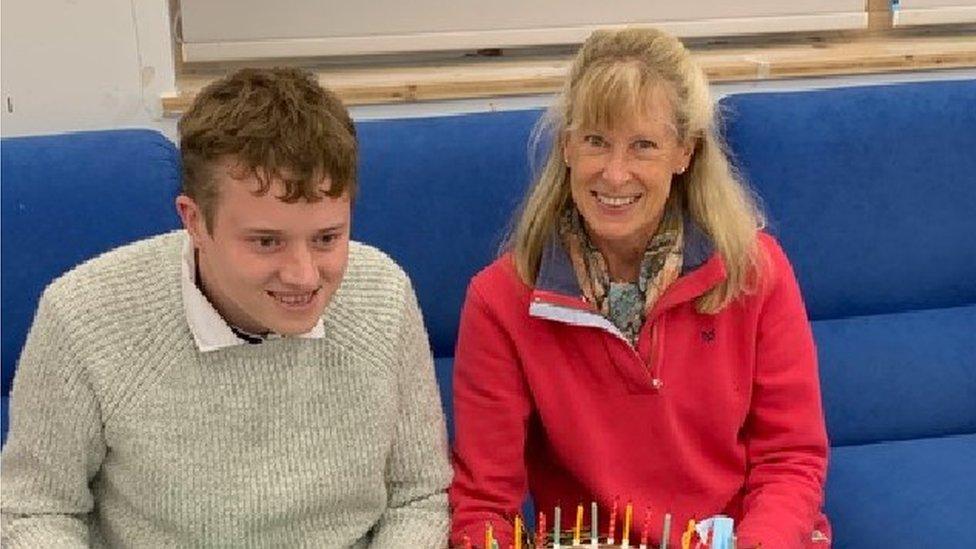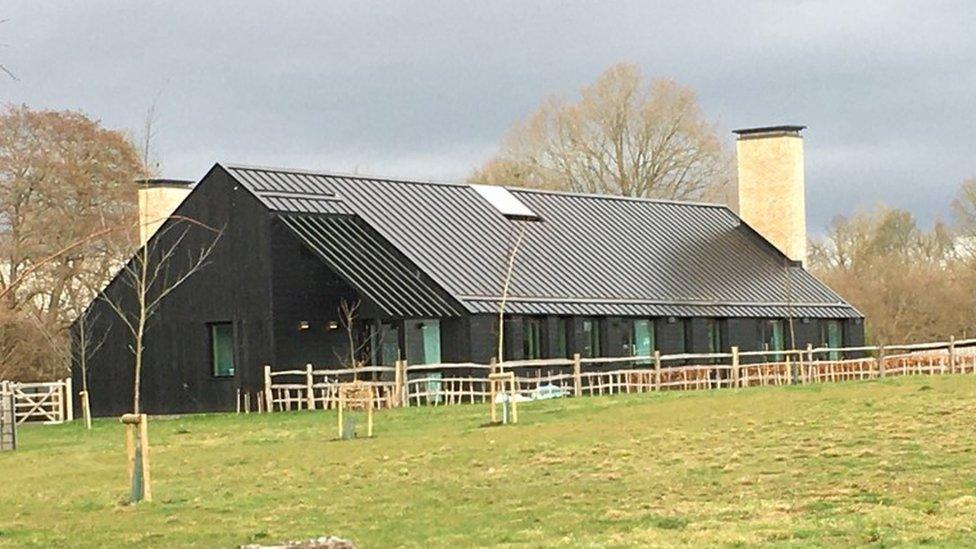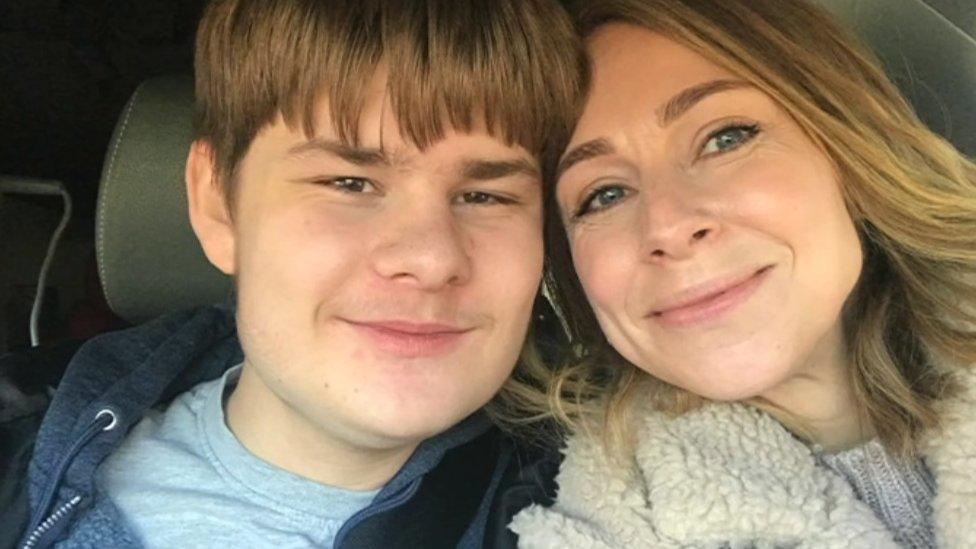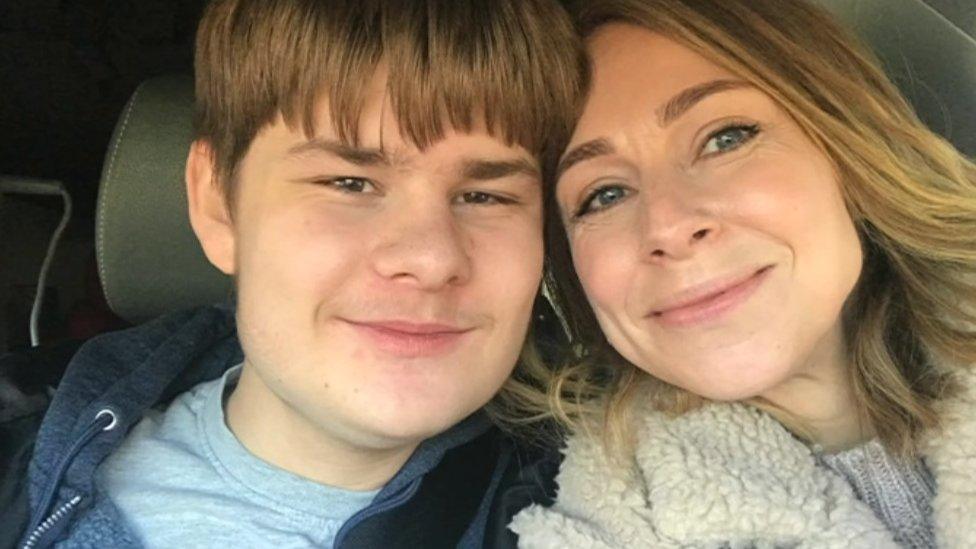Linden Farm: The family who turned a care home for adults with complex needs on its head
- Published

Simon and Sally Lawrence celebrating his 30th birthday
Finding a home for adults with complex care needs can be a challenge many families face. But one couple decided to try something new and developed a care home for their son which has gained international interest.
When Simon Lawrence was eight he was sent to a residential school miles away from home.
"He had complex needs and we just couldn't manage," his mum Sally tells the BBC podcast Access All. "To let him go at the age of eight, my heart has been broken many times."
Simon, now 30, is autistic, non-verbal, has epilepsy and needs round-the-clock care and two-to-one support when he is out and about.
He was lucky with his residential placements growing up. Although they were a long way from home, he was happy. After school he transferred to a young person's centre on the same site, and could stay there until he was 26. After that the family needed to find something new.
"We used to say that school was like the honeymoon period for people with severely disabled children, because after that there is nothing."
The family spoke with their local authority, Surrey County Council which, try as it might, could only find placements in area such as Yorkshire and Cornwall, due to a shortage of provision - a problem faced by families all over the country.
But the Lawrence's were adamant, Simon must live near them.
"We want to be part of his life, he part of ours. That was our starting point," Sally says.
Along with other local parents in the same situation, Sally and Peter Lawrence set up The Simon Trust to see if they could provide residential care for multiple adults with complex needs but in a different way.
Traditionally, the residential building, care provision and all facilities are organised by the local authority. Some places are paid for, others might be partially funded.
But this time, the Lawrence's wanted to offer some financial contribution, through fundraising, to create an on-going partnership and have some say in the care.
The result was Linden Farm, a 10-bed home which offers accommodation, activities and specialised care for autistic adults with complex needs.
Working with the council, the Trust found a plot of land on the edge of a village where building permission was given. The council paid for that and construction, and it also sourced and trained the staff to provide round-the-clock care.
When Linden Farm was opened to residents, they moved in as tenants who were eligible for housing benefit and paid for the accommodation via rent, rather than the local authority absorbing all of the costs.
It also means the residents have the same rights as any tenants on the open market and cannot be evicted unexpectedly, and they enjoy an element of independence.

Linden Farm provides a home for 10 adults with complex needs
Crucially, all the residents at Linden Farm are local to their families which provides that extra level of comfort and assurances that they are happy and safe and it is less likely to lead to a costly breakdown in care provision and re-homing.
"In the end we got Surrey County Council on our side and we proved to them that they would save money," Sally says.
The parents and those supporting The Simon Trust also raised about £300,000 to have a say in and provide "extra essentials" such as bespoke kitchens and sensory rooms which provide a meaningful life.
"Simon loves cycling, but he's not safe on a road. So, the latest thing we've done is provide a 400-metre cycle track."
Sally says others love to walk and run around it and it is the perfect place to fly a kite.
Linden Farm is deliberately situated on the edge of a village so it also provides a good amount of space for the residents and enables them to be part of the community.
Sarah London is one parent who recently came across Linden Farm while struggling to find suitable accommodation for her son, Harrison.

Harrison and Sarah London
Harrison, who turns 18 in September, has had a challenging few years after the specialist school he had been at for a decade was closed overnight following an Ofsted inspection.
Since then, Harrison, who has complex needs and is deaf, has been in temporary adult accommodation.
He has a roof over his head, but his education has stopped and there are few activity opportunities for him, Sarah says.
"He spent the best part of five months trapped in a bedroom," she says. "And he's really struggled with this transition, moving from everything he's known."
Hampshire County Council, Harrison's local authority, said its team "work extremely hard to support young adults with complex disabilities to access appropriate care and support".
But Sarah is not satisfied and wants to look at greater opportunities for Harrison.
She is not alone in her interest being piqued by what Linden Farm has achieved. The Guardian recently reported five British families were talking with The Simon Trust about how to create such a home and since then it has swollen to more than 30 families showing interest, from Barbados to Abu Dhabi.
Sarah says: "I've submitted a proposal [to the council] that suggests we use Linden Farm as a blueprint. It's an incredible place, why would we not want to roll that out into other counties?
"It isn't just a housing solution. You're giving these individuals a purpose and an opportunity to explore things they would enjoy. And also giving them some of that independence that they crave."
While Linden Farm has been praised as "pioneering", there are other things to consider. Simon's parents "take each year as it comes" knowing that there is no guarantee Simon's tenancy will last forever and maintenance costs can be high, which the Trust helps fund.
But Sally says it's worth it.
"Simon gets brought home every Sunday at 12:00 and his face tells me everything - he usually has a grin from ear to ear when he's pleased to see us, which is lovely. But he also has that grin when he goes back to Linden Farm."
You can listen to the podcast and find information and support on the Access All page. If you've got a story get in touch with Beth by emailing bethany.rose@bbc.co.uk.

Related topics
- Published30 November 2022
